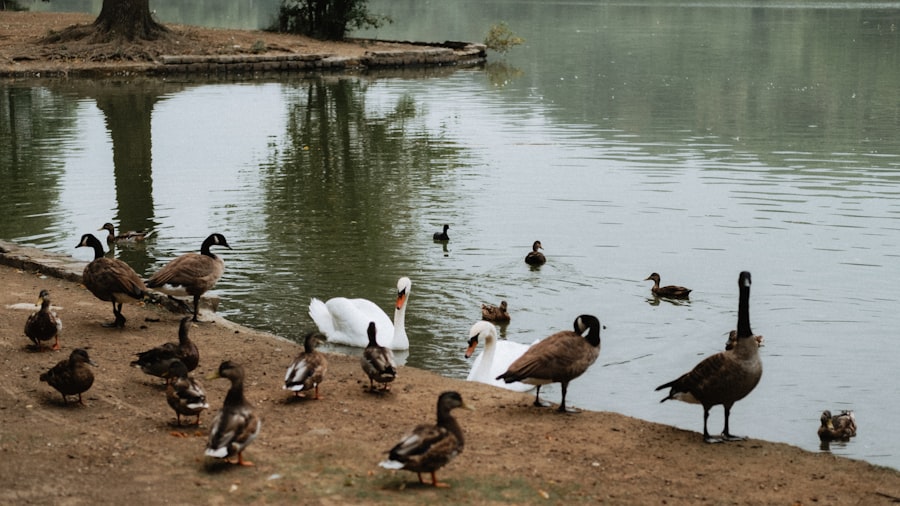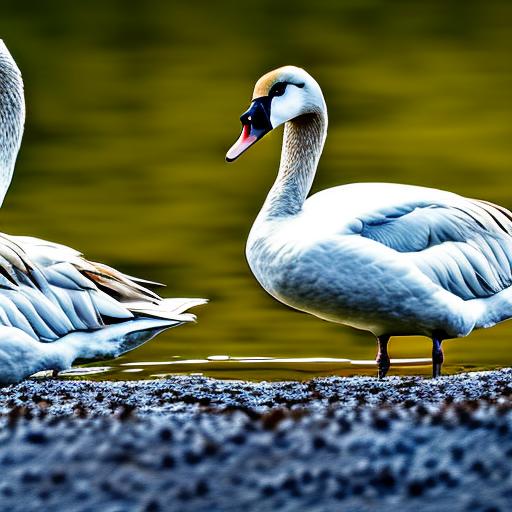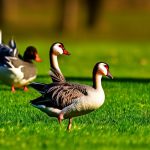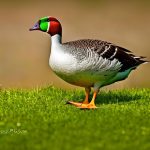Swans and geese are two species of waterfowl that often share the same habitats. While they may appear similar in some ways, they have distinct behaviors and interactions with each other. Understanding the relationship between swans and geese is important for managing their populations and maintaining ecological balance.
Key Takeaways
- Swans and geese have a complex relationship, with swans being territorial and aggressive towards geese.
- Swans use a variety of methods to keep geese away from their territory, including vocalizations and physical displays.
- Swans can exhibit aggressive behavior towards geese, including chasing and attacking them.
- Swans play an important role in maintaining ecological balance, as they help control the population of geese and other waterfowl.
- Geese can have a negative impact on swan habitat, as they can damage vegetation and compete for resources.
The territorial nature of swans and geese
Both swans and geese are highly territorial birds. They establish territories for breeding, nesting, and feeding purposes. Swans are known to be particularly aggressive when it comes to defending their territories. They will chase away any intruders, including geese, that come too close.
Establishing territories is crucial for swans and geese because it ensures they have access to the resources they need to survive and reproduce. By defending their territories, they can secure food sources, nesting sites, and mates. This territorial behavior also helps to maintain population densities within a given area.
How swans keep geese away from their territory
Swans have several territorial defense mechanisms that they use to keep geese away from their territory. One of the most common methods is aggressive displays, such as hissing, flapping their wings, and charging at intruders. These displays are often enough to intimidate geese and make them retreat.
In addition to aggressive displays, swans also use physical force to keep geese away. They may bite or peck at geese that come too close, causing them to flee. Swans are much larger and stronger than geese, so their physical presence alone can be enough to deter geese from entering their territory.
The aggressive behavior of swans towards geese
Swans are known for their aggressive behavior towards geese, especially during the breeding season. This aggression is driven by a desire to protect their nests and offspring from potential threats. Swans see geese as competitors for resources and potential predators to their young.
During the breeding season, swans may actively chase geese away from their territory, sometimes even attacking them. They will use their large wings and strong beaks to intimidate and harm geese if necessary. This aggressive behavior is a natural instinct for swans and is essential for ensuring the survival of their offspring.
The role of swans in maintaining ecological balance
Swans play an important role in maintaining ecological balance in their habitats. They are herbivores and feed on aquatic plants, including algae and submerged vegetation. By consuming these plants, swans help to control their growth and prevent overgrowth, which can negatively impact other species in the ecosystem.
In addition to controlling plant growth, swans also contribute to nutrient cycling in their habitats. Their droppings contain high levels of nitrogen and phosphorus, which are essential nutrients for aquatic plants. When swans defecate in the water, these nutrients are released and can be taken up by plants, promoting their growth.
The impact of geese on swan habitat

While swans have a positive impact on their habitats, geese can have a negative impact on swan habitat. Geese are also herbivores and feed on similar aquatic plants as swans. When geese overpopulate an area, they can deplete the vegetation, leaving little food for swans and other waterfowl.
Geese can also cause damage to swan habitat through their feeding behavior. They often graze on grassy areas near water bodies, which can lead to erosion and destruction of vegetation. This can result in loss of nesting sites for swans and other waterfowl, further impacting their populations.
The effectiveness of swans in deterring geese
Swans are generally effective in deterring geese from their territory. Their aggressive behavior and territorial defense mechanisms are usually enough to keep geese at bay. Geese are aware of the potential harm that swans can cause and will often avoid confrontation with them.
There have been numerous reports of swans successfully deterring geese from areas where they are not wanted. In some cases, the presence of swans alone is enough to keep geese away, without any need for physical aggression. This makes swans a valuable tool for geese control in certain situations.
The benefits of having swans to keep geese away
Using swans to keep geese away has several advantages. Firstly, it is a natural and non-lethal method of geese control. Swans are native to the areas where they are used, so their presence does not disrupt the ecosystem or harm other species. Secondly, swans are highly effective in deterring geese, reducing the need for other control methods.
There have been successful programs where swans have been introduced to areas with high goose populations to keep them in check. These programs have seen a decrease in goose numbers and a reduction in the damage caused by geese. Swans provide a long-term solution to geese control, as they will continue to defend their territories year after year.
The potential drawbacks of relying on swans to control geese
While using swans for geese control has its benefits, there are also limitations to this approach. Swans can be aggressive towards other waterfowl and may harm or displace them in the process of defending their territories. This can disrupt the balance of the ecosystem and negatively impact other species.
There have also been cases where swan programs have been unsuccessful in controlling geese populations. This may be due to factors such as inadequate numbers of swans or ineffective management strategies. It is important to carefully consider the specific circumstances and potential drawbacks before implementing a swan program for geese control.
Alternatives to using swans for geese control
There are alternative methods for geese control that can be used in conjunction with or instead of swans. These include habitat modification, such as removing or altering vegetation to make areas less attractive to geese. Another method is the use of deterrents, such as noise makers or visual scare devices, to discourage geese from entering certain areas.
There have been successful programs where these alternative methods have been used to control geese populations. For example, the installation of fences or barriers around sensitive areas can effectively keep geese out. The use of trained dogs to chase geese away has also proven to be an effective and non-lethal method of geese control.
Understanding the relationship between swans and geese is crucial for effective geese control and maintaining ecological balance. Swans are highly territorial and use aggressive behavior to keep geese away from their territory. They play an important role in the ecosystem by controlling plant growth and contributing to nutrient cycling.
While swans can be effective in deterring geese, there are limitations to relying solely on them for geese control. It is important to consider the potential drawbacks and explore alternative methods for managing geese populations. By taking a comprehensive approach to geese control, we can ensure the preservation of both swan and goose populations while maintaining a healthy ecosystem.
If you’re interested in learning more about how to keep geese away, you might also want to check out this informative article on Poultry Wizard. They discuss the fascinating relationship between swans and geese and how swans can be used as a natural deterrent for geese. To find out more, click here: https://poultrywizard.com/keeping-quail/what-vegetables-do-quails-eat/.
FAQs
What is the article about?
The article is about whether swans can keep geese away.
Do swans keep geese away?
Yes, swans are known to keep geese away from their territory.
How do swans keep geese away?
Swans are territorial birds and are known to be aggressive towards other birds that enter their territory. They will chase away geese and other birds that come too close.
Are there any other benefits to having swans?
Yes, swans are beautiful birds that can add aesthetic value to a pond or lake. They also help control the population of aquatic plants and insects.
Can geese and swans coexist peacefully?
It is possible for geese and swans to coexist peacefully, but it depends on the individual birds and their behavior. In some cases, geese and swans may fight over territory or resources.
What should I do if I have a problem with geese?
If you have a problem with geese, there are several solutions you can try. These include using noise deterrents, physical barriers, or hiring a professional to remove the geese. However, it is important to check local laws and regulations before taking any action.
Meet Walter, the feathered-friend fanatic of Florida! Nestled in the sunshine state, Walter struts through life with his feathered companions, clucking his way to happiness. With a coop that’s fancier than a five-star hotel, he’s the Don Juan of the chicken world. When he’s not teaching his hens to do the cha-cha, you’ll find him in a heated debate with his prized rooster, Sir Clucks-a-Lot. Walter’s poultry passion is no yolk; he’s the sunny-side-up guy you never knew you needed in your flock of friends!







